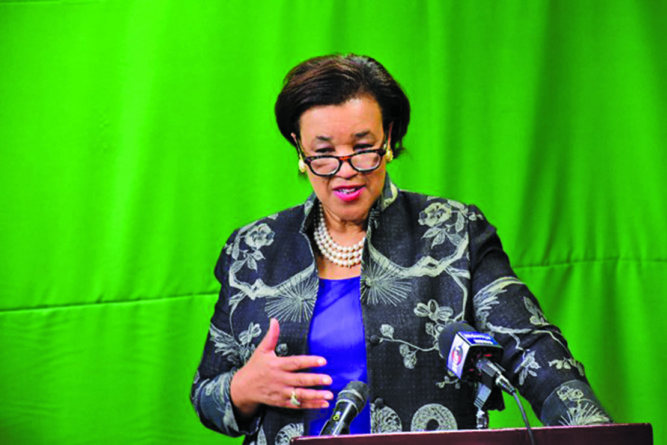Commonwealth calls for restoration of constitutional rule in Guyana
The Commonwealth has become the latest organisation to criticise the Government for operating outside of the norms of constitutional rule, urging caretaker President David Granger to call elections immediately.
In the statement, which was issued on Monday, Secretary General Baroness Patricia Scotland urged the President to immediately set an early election date. Scotland noted that this must be done in accordance with the Constitution of Guyana, so that constitutional rule can be restored.
The Secretary General referenced the Caribbean Court of Justice’s ruling, which had clearly set out the timeframe for an election after a No-Confidence Motion. As such, Scotland said in her statement that elections were constitutionally overdue in Guyana.
“The CCJ’s ruling was clear that the Guyana Constitution sets out certain requirements for the time of an election after the valid passing of a No-Confidence Motion. The rule of law and constitutional governance are fundamental Commonwealth values to which Guyana has subscribed,” Scotland said.She added that a general election should be held in accordance with the unambiguous constitutional imperative to do so.
The Secretary General has spoken with the Chair of the Guyana Elections Commission (GECOM) and discussed Commonwealth support to GECOM, the statement added.
Guyana is one of 53 member countries of the Commonwealth, which comprises almost entirely of former British colonies. The commonwealth has been known to suspend member countries for violating democratic principles, including Nigeria, Zimbabwe and Pakistan.
Even today, Zimbabwe still has a membership application pending before the Commonwealth, with Zimbabwe President Emmerson Mnangagwa meeting Baroness Scotland on the sidelines of the United Nations General Assembly (UNGA) on Monday to discuss it.
Unconstitutional rule
It has been over nine months since a No-Confidence Motion was passed against the David Granger-led Government. The Constitution of Guyana stipulates that elections must be held within three months of the passage of such a motion.
The constitutional deadline for holding elections, as set out by the CCJ, expired as of September 18. When it made its June 18 ruling on the no-confidence cases, the Caribbean Court of Justice (CCJ) had said that the effect of the No-Confidence Motion was on pause while the cases were being litigated.
That process, CCJ President Adrian Saunders had clearly said, was no longer on pause following the Court’s June 18, 2019 ruling, which upheld the validity of the No-Confidence Motion and thus triggered the need for fresh elections.
In keeping with the constitutional three months’ provision once a No-Confidence Motion is passed, General and Regional Elections should have been held on or before September 18, 2019.
Despite Guyana Elections Commission (GECOM) Chairman, retired Justice Claudette Singh informing the President that GECOM will be in a position to hold elections by February 2020, President Granger is yet to name an election date.
Granger had even promised the Carter Center, during a meeting, that he would act swiftly when GECOM advises him as to an election date. Granger was informed since Thursday last by GECOM Chair, retired Justice Claudette Singh, that the Secretariat could conduct elections at the end of February.
After announcing that he would have to discuss this with Cabinet before naming an election date, the President is yet to meet with his Cabinet. It is expected that this full Cabinet meeting will take place today, though as per the CCJ ruling a Government Cabinet stands resigned.
It was only days ago that members of the diplomatic corps, such as representatives of the United States, the United Kingdom and the European Union, called for the President to immediately name an election date.
On Friday last the Bar Council of the Bar Association of Guyana condemned the coalition Government for its failure to hold General and Regional Elections within the period mandated by the Constitution, which it reminded is supreme law.
This came after protests against the President and pressure from the diplomatic community, to ensure the Government acts in accordancewith the Constitution. The People’s Progressive Party (PPP) has already warned that they will continue to protest for constitutional compliance until the President names an election date.






















